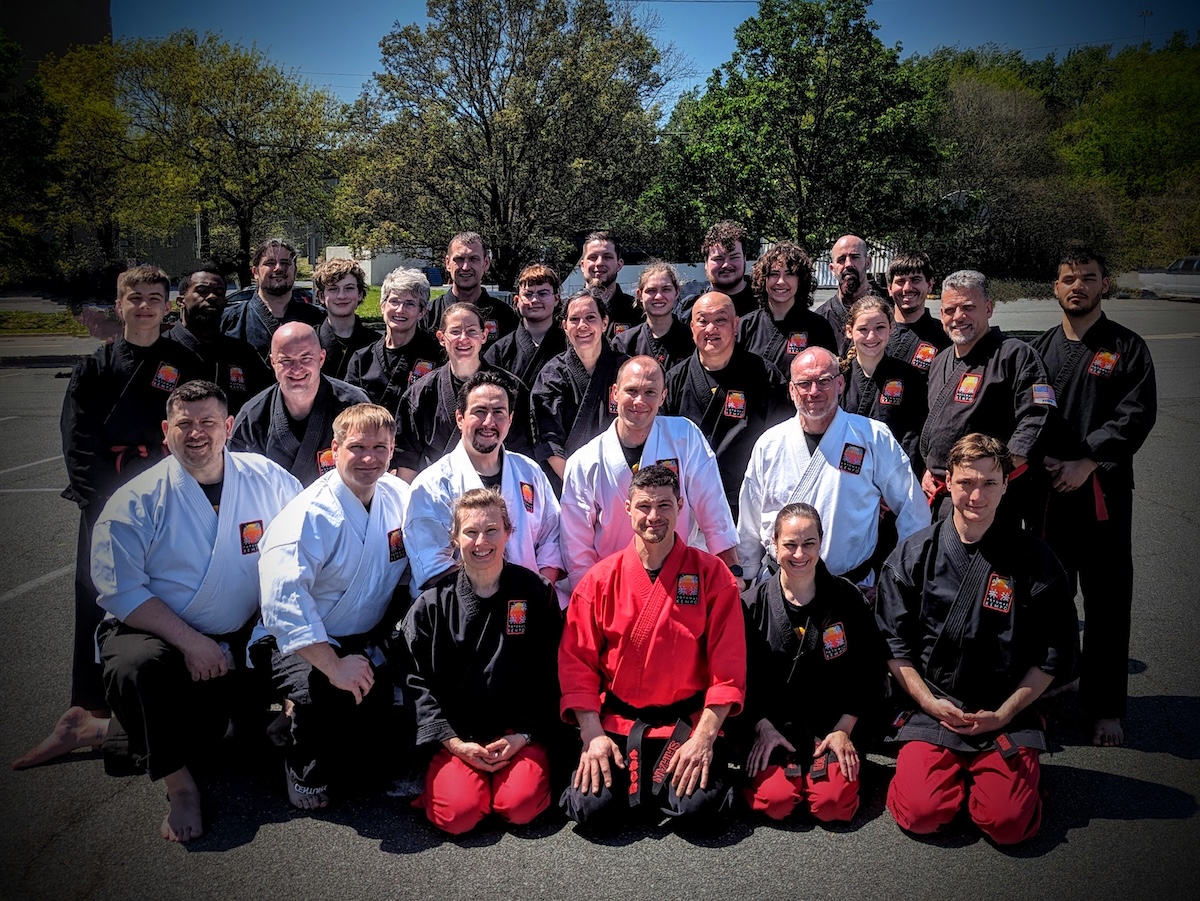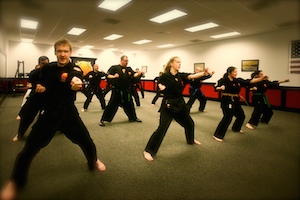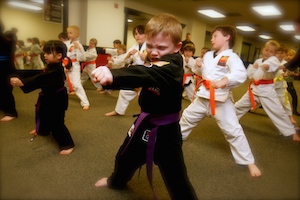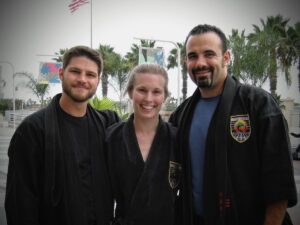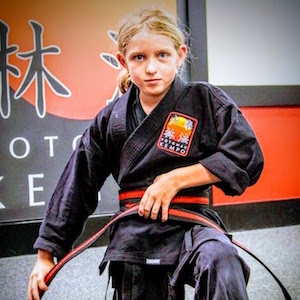José, a 52-year-old software engineer with a small company in Arlington, likes to compare martial arts to graduate work.
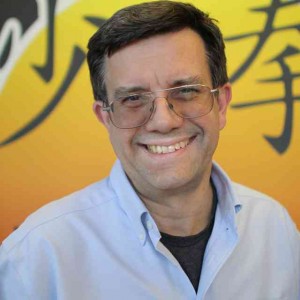 “I got a masters degree from George Mason, and this feels like the same major commitment of time and effort,” he says. “That’s why so many people start and don’t finish. But I don’t like quitting. Plus, it’s good for me. If I wasn’t doing karate, I would be at home watching TV.”
“I got a masters degree from George Mason, and this feels like the same major commitment of time and effort,” he says. “That’s why so many people start and don’t finish. But I don’t like quitting. Plus, it’s good for me. If I wasn’t doing karate, I would be at home watching TV.”
Among the older students at Potomac Kempo, José began taking classes five years ago, when his son Stephen Rubio – an instructor at the dojo – gave him and his wife each a week of classes as a gift. At the time, José had been working out at a local gym twice a week. He had never practiced martial arts and didn’t consider himself an athlete or jock. Furthermore, he was somewhat concerned about being one of the older students, being a slow learner and not be able to keep up. But José found almost immediately that he enjoyed the practice and soon began realizing its benefits.
“This is a big step up from my gym workout,” he says. “At first, you learn all the strikes and stances, and then you have to practice, practice, practice. It was a challenge at the beginning. But the students are nice, and the instructors are patient.” He says there are some students who can do hundreds of burpees and some who can’t do any. “I’m not the best and not the worst; I’m about in the middle.”
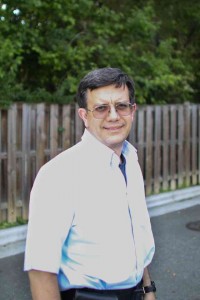 José says he is in much better shape today, with improved balance and more options in his self-defense toolbox – tools he hopes he never has to use. His chronic back and knee pain have all but gone dormant the last few years, after plaguing him on a regular basis – he used to throw his back out every six months. And Kempo has also benefited him psychologically.
José says he is in much better shape today, with improved balance and more options in his self-defense toolbox – tools he hopes he never has to use. His chronic back and knee pain have all but gone dormant the last few years, after plaguing him on a regular basis – he used to throw his back out every six months. And Kempo has also benefited him psychologically.
“One of the reasons I started the classes was to help with anger management – stuff like road rage,” he says. “When I leave work, sometimes I’m angry at a lot of little things, and if I go right to a class, then I go home in a much better mood. It helps with my level of happiness.”
In April, José successfully completed a black belt test, which was held outside at a park in Alexandria. “It was a pretty intense test, on one of the first hot days of the season, and I had no trouble doing it,” he says. His overall physical conditioning, he adds, is what enabled him to make it through a grueling day of physical challenges in energy-sapping weather.
These days, José is at the dojo three times a week, working particularly on forms that involve good balance and coordination, such as spinning kicks. “Some guys get it quickly,” he says. “It takes me more time. I’m also a little slow in sparring, with my reaction time to my opponent. So people have time to punch me. I need to improve that.”
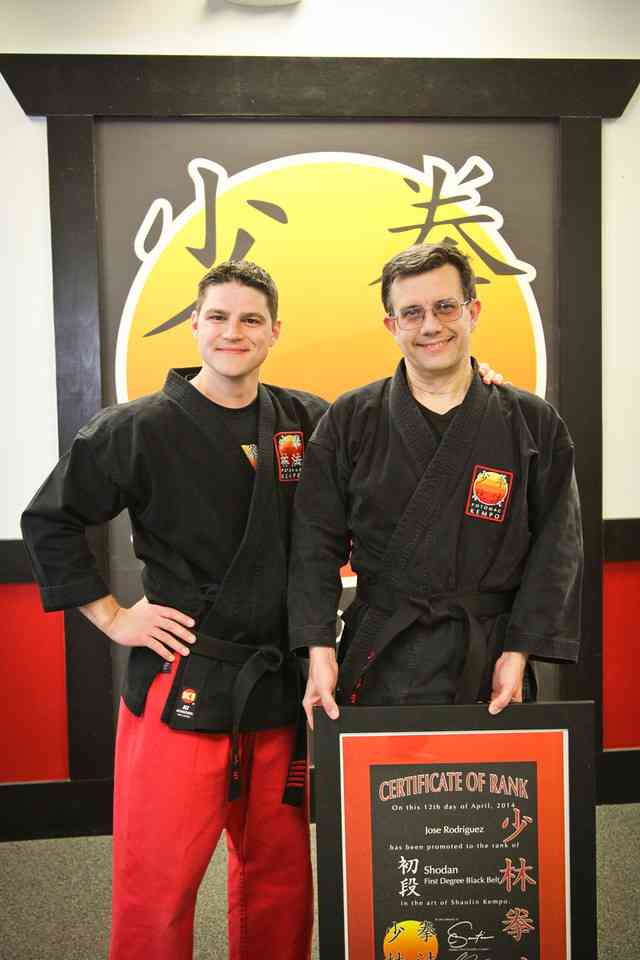 Unlike a graduate degree, in Kempo, there isn’t one final commencement day, when the student can put everything behind him. But that’s one of the things José likes so much about the practice.
Unlike a graduate degree, in Kempo, there isn’t one final commencement day, when the student can put everything behind him. But that’s one of the things José likes so much about the practice.
“Once you know the basic curriculum, you learn the more subtle and advanced stuff,” he says. “Things like take-downs on your knees, or where you barely use one hand to flip the other person onto their back. I’m like, wow! How do I do that? The training is continuous. If you quit, you go back to being fat, slow and out of breath. So as long as I can, I’m sticking to it and trying to improve.”
